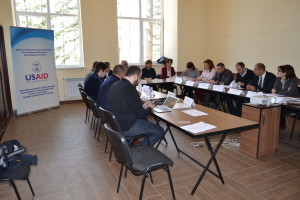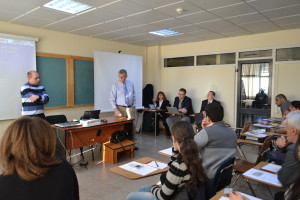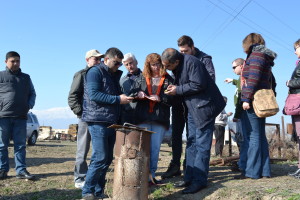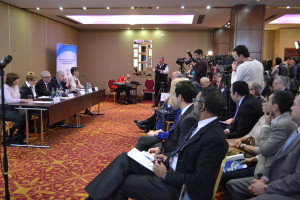Author: admin
ASPIRED HOSTED S&T ADVISER TO THE U.S. SECRETARY OF STATE
 On April 14, the ASPIRED team hosted Dr. Vaughan Turekian, Science & Technology Adviser to the US Secretary of State, along with the representatives of USAID and ICARE (International Research for Agribusiness Research and Education). Dr. Turekian visited Armenia is exploring ways of how diplomatic relations can open new opportunities for the development of science and technology and how science and technology can strengthen diplomatic relations.
On April 14, the ASPIRED team hosted Dr. Vaughan Turekian, Science & Technology Adviser to the US Secretary of State, along with the representatives of USAID and ICARE (International Research for Agribusiness Research and Education). Dr. Turekian visited Armenia is exploring ways of how diplomatic relations can open new opportunities for the development of science and technology and how science and technology can strengthen diplomatic relations.
The ASPIRED team presented the project and its main component. The specific emphasis was placed on the role of technology and innovations in helping to prevent further depletion of the groundwater resources in the Ararat Valley. The ASPIRED team also focused on its partnership with the USGS and the USAID Global Lab in bringing innovative solutions to the project.
SECOND INTERAGENCY TASK FORCE MEETING HELD BY ASPIRED

On April 4-5, the ASPIRED Project convened the second meeting of the Interagency Task Force, whose job is to provide recommendations to the Government of Armenia on the most rational fees for the use of underground water resource by fisheries in the Ararat Valley.
The roadmap of activities was elaborated following the first meeting of the Task Force in January 2016. Over the recent period, the team conducted the survey of the fish farms, with the use of electronic questionnaires and visited selected fisheries to interview the owners. The purpose of the survey was to understand the current status and issues of the sector and its future trends in the light of recent market developments. The results of the survey and facts, issues and observations made during the site visits as well as preliminary economic analysis of the fish farming sector was presented and discussed with the participants.
Another important topic of the meeting was the classification of the fish farms. While the ASPIRED team analyzed the best practice in the classification of the fish farms, the Task Force members presented their own recommendations as to which criteria should be used for classifying between large, medium and small-sized fisheries. This is particularly important if the diversified underground water use fee is proposed for adoption.
There was a heated debate among participants on the most acute financial and economic problems of the fish-breeding sector and an issue of finding a reasonable balance between the resource conservation priorities, rational use of underground water and the sector development needs.
BUILDING GROUNDWATER MANAGEMENT CAPACITY FOR ARMENIA’S ARARAT VALLEY


On February 29 – March 2, the USGS (US Geological Survey) conducted the training on building groundwater management capacity for Armenia’s Ararat Valley for the representatives of the Ministry of Nature Protection and its agencies. The training program was made possible due to the partnership between USAID’s ASPIRED Project, ICARE (International Center for Agribusiness Research and Education) via its PEER (Partnerships for Enhanced Engagement in Research) grant and USGS.
The goal of the training was to improve participants’ understanding of the groundwater modeling and field protocols regarding well inventory and collection of data. The training focused on the importance of the well inventory, including modern well inventory techniques, measurement and data collection processes and equipment needs. This interactive course consisted of the class-room training and field work for making well measurements and observations in the Ararat Valley.
USAID LAUNCHES ASPIRED PROJECT TO ADDRESS GROUNDWATER RESOURCE CHALLENGE IN ARARAT VALLEY

During a public event on February 10, USAID announced the launch of the Advanced Science and Partnerships for Integrated Resource Development Project (ASPIRED) – a three-year initiative designed to curb the rate of groundwater abstraction in the Ararat Valley to sustainable levels. USAID Armenia Mission Director Karen Hilliard, Deputy Minister of Nature Protection Simon Papyan, representatives of the central government, regional authorities of Armavir and Ararat provinces, and local and international organizations attended the event.
USAID’s recent assessment of the status of groundwater resources in the Ararat Valley – the country’s key agricultural hub – has indicated an alarming situation. The decreasing level of the groundwater supply and the uncontrolled use of artesian water by fish farms has left some 30 communities in the Ararat and Armavir marzes without reliable access to drinking or irrigation water.
In addition, these water shortages pose a real threat to the country’s agricultural sector, the socio-economic and environmental well-being of these regions, as well as the safety and security of Armenia’s sole nuclear power plant, Metsamor, which relies on these water resources for its cooling system. Despite recent measures by the Armenian government to regulate the use of artesian water in the valley, the situation remains serious and is among the Armenian Government’s top priorities.
USAID’s new ASPIRED project will assist the Government of Armenia in developing consistent policy and technical solutions for a more regulated use of these vital groundwater resources. The project will focus on closing data gaps, improving technical capacities and tools for informed decision-making, increasing access to innovative water conservation and energy efficiency technologies, and promoting regulatory and enforcement mechanisms.
ASPIRED will also conduct an inventory of the wells and springs in the Ararat Artesian Basin, create a publicly accessible integrated data system for the valley, install an automated control system for monitoring groundwater abstraction in ten selected fisheries, and pilot innovative technologies for efficient groundwater and energy use. Policy recommendations will be provided to the Armenian government to optimize fees for underground water use by fisheries and introduce stricter water permit practices and oversight.
New Interagency Task Force to Assess Ground Water Fees in Armenia
 The USAID-funded Advanced Science and Partnerships for Integrated Resource Development Project (ASPIRED) recently set the ambitions goal of reducing the rate of the groundwater extraction in Armenia’s Ararat Valley to sustainable levels. The rapid shrinking of the groundwater resources in the valley has reached alarming rates over the past decade. More than 30 communities in the area confront severe water shortages for both drinking and irrigation. This is especially troublesome because the Ararat Valley is the country’s agricultural hub.
The USAID-funded Advanced Science and Partnerships for Integrated Resource Development Project (ASPIRED) recently set the ambitions goal of reducing the rate of the groundwater extraction in Armenia’s Ararat Valley to sustainable levels. The rapid shrinking of the groundwater resources in the valley has reached alarming rates over the past decade. More than 30 communities in the area confront severe water shortages for both drinking and irrigation. This is especially troublesome because the Ararat Valley is the country’s agricultural hub.
One of the critical factors in ensuring a more sound management of underground water resources is setting realistic tariffs for the groundwater use by fisheries – the largest consumers of artesian water in the area. In 2015, the Armenian government revised water use permits for fisheries by reducing allowable limits of water abstraction and slightly increased the groundwater use fees.
In coordination with the Ministry of Nature Protection, ASPIRED helped establish an Interagency Task Force to study and provide recommendations to the Government of Armenia on the most optimal groundwater fee rates for fisheries. Its first meeting took place on January 15, 2016. The newly established Task Force will attempt to find a balance between the resource conservation objectives and industry needs.
ME&A began implementing ASPIRED for USAID/Armenia in October 2015. The project is a follow on to the Clean Energy and Water Program (CEWP), which ME&A managed from 2011 to its completion in September 2015.
ASPIRED is funded under the Water and Development IDIQ (WADI) to provide USAID’s E3 Bureau with services and technical support to assist USAID Missions, Bureaus and Offices worldwide in the implementation of the Agency’s Water and Development Strategy.
